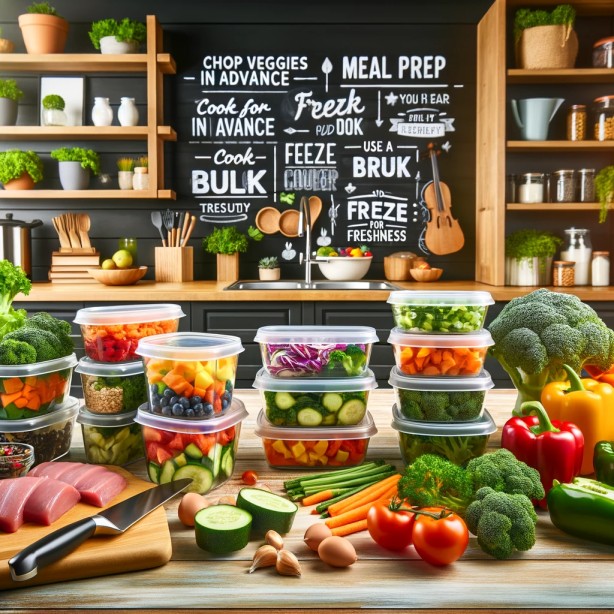
Blog
Meal Prep 101: Tips and Tricks for Busy Lifestyles

Finding the time to prepare healthful meals daily in the fast-paced world of modern living can be as difficult as winning big at Hellspin Casino. It shows in meal preparation. It’s a viable answer for anyone wanting to eat healthy, manage portions, save time, and minimize stress. This comprehensive book will help you master meal preparation. It includes everything, including cooking, storage, and purchasing.
1. Planning: The Foundation of Successful Meal Prepping
Planning is the first stage in cooking a meal. Prior to cooking, decide which day of the week you will grocery buy. On the weekends, you typically have more time to yourself. Take the time to organize your meals for the upcoming week, including breakfasts, lunches, dinners, and any snacks. Make a thorough grocery list based on your meal plan. It will help you make thoughtful decisions and ensure that you have all you need.
2. Keep It Simple and Nutritious
Choose meals that are easy to make and include a good balance of nutrients. Make use of recipes that combine comparable components to save money and waste. For instance, if you get spinach, utilize it in a few different dishes. Aim for a healthy balance of carbohydrates, healthy fats, and protein; also, make sure to incorporate enough of fruits and vegetables. Consider grilled chicken with rice and veggies, or on salads or sandwiches.
3. The Art of Efficient Cooking
When preparing meals, efficiency is essential. Cooking in bulk for a single recipe and consuming it during the week is known as batch cooking. This is useful for casseroles, stews, and soups. A different approach gives diversity, though it can necessitate a bit more planning. Construct and prepare multiple meals at the same time.
Utilize your kitchen’s appliances to their full potential. There may be significant time and effort savings with rice cookers, pressure cookers, and slow cookers. For example, you may roast the vegetables in the oven and cook the rice or quinoa on the stove while the stew is cooking in the slow cooker.
4. Mastering the Storage Game
Food must be properly stored if you want it to remain tasty and fresh. Purchase airtight, high-quality food storage containers. Glass is the best material to use for meal reheating because it doesn’t hold on to smells or stains and is generally safer than plastic. Make sure there is no BPA in the plastic containers you use.
Put the contents and the cooking date on the labels of your containers. For up to four days, most prepared foods store nicely in the refrigerator. Use your freezer if you plan to cook for an extended amount of time. It’s crucial to know which foods freeze well and which don’t, so keep that in mind.
5. Variety is the Spice of Life
It’s critical to maintain interest in order to prevent meal prep tiredness. Make sure you’re not eating the same thing every day by rotating your recipes once a week. Try experimenting with different herb and spice blends to add new flavors to your regular dishes. If you prepare grilled chicken, consider serving it with quinoa salad and a fresh vegetable wrap one day, then spaghetti with a simple sauce the next.
6. Meal Prep-Friendly Recipes to Get You Started
Start with a few quick and easy recipes that come together quickly and taste delicious in large quantities. Here are some recommendations that are offered:
Quinoa: Prepare some quinoa. Give roasting a try with some of your preferred veggies. Then toss everything together with a light vinaigrette made of olive oil and lemon juice. You may eat this salad cold or at room temperature; it stays nicely in the fridge.
Filling Chili: A delicious chili is a terrific way to start a meal. It freezes well, is simple to make in big numbers, and may be customized to your tastes.
Baked chicken breasts: Season a big batch of chicken breasts in advance to use in taco shells, salads, and other dishes all week long. Even sliced, they look great served with vegetables and nutritious grains.
7. The Importance of Flexibility
Finally, be adaptable when it comes to meal preparation. You may need faster options for a few weeks. Some weeks you might have more time to prepare lavish feasts. The secret is to adjust a schedule to fit your lifestyle. Keep in mind that cooking, even a tiny quantity of food, aids in your goal-achieving.
Final Thoughts
Meal planning can greatly improve busy lifestyles. It all comes down to making informed decisions in the end. As you readied yourself, maintain your dedication to your health. If you adhere to these suggestions and techniques, you should have no problem mastering the art of food preparation. Even the busiest weeks may be prepared for with delicious, home-cooked meals.

